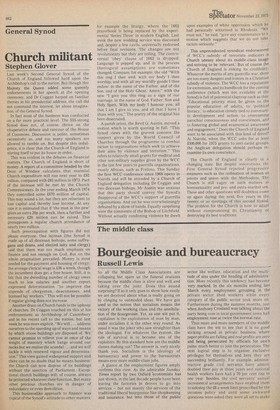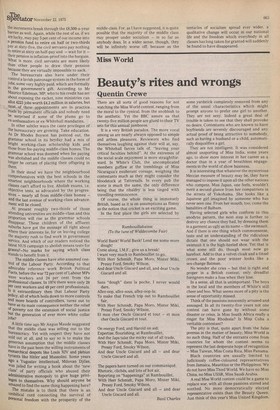The middle class
Bourgeoisie and bureaucracy
Russell Lewis
So all the Middle Class Associations are collapsing but spare us the funeral orations because the middle class is alive and well and taking over the joint. Does this sound surprising? If so it only goes to show how easily we are deceived about what is really going on by clinging to outmoded ideas. We have got used to the notion that socialism means the victory of the working class and the annihilation of the bourgeoisie. Yet, as one wit put it, capitalism is the exploitation of man by man, under socialism it is the other way round. As usual it was the joker who saw straighter than the ideologist. For whatever the system, the rule of survival is to become one of the exploiters. By this standard how are the middle classes making out? The answer is, very nicely thank you. Socialism is the ideology of bureaucracy and power to the bureaucrats means ever more middle-class jobs.
A glance at the employment figures amply confirms this view. As the admirable Sunday Times report by two Oxford -economists has just shown, in the last decade people have been leaving the factories in droves to go into services — but not mainly the services of the traditional liberal bourgeoisie like shopkeeping and insurance, but into those of the public
sector like welfare, education and the multitude of sins under the heading of administration. More rebently this tendency has become very marked. In the six months ending last March every employment grouping in the private sector shed workers while every category of the public sector took more on. Furthermore during the summer months, just when Anthony Crosland was talking about the party being over in local government town hall employment rose at twice the normal rate.
Thus more and more members of the middle class have the wit to see that it is no good sticking around in private business where paper profits are falling and real profits are zero and being persecuted by officials for one's pains: much better to join the persecutors. The next logical step is to organise exclusive privileges for themselves and here they are succeeding brilliantly. For example, administractive grade civil servants have almost doubled their pay in three years and national health workers have had a 70 per cent rise in one year. Besides, the civil servants' annual incremental arrangements have enabled them to sidestep the £6 a week limit prescribed by the incomes policy and until some awkward questions were asked they were all set to make
the increments break through the £8,500-a-year barrier as well. Again, while the rest of us, if we are lucky, may pays per cent of our income into a pension fund to retire on half or two-thirds pay at sixty-five, the civil servants pay nothing to retire at sixty on half-pay and — wait for it — their pension is inflation-proof into the bargain. What is more, civil servants are more likely than other people to draw their pension because they are virtually impossible to sack.
The bureaucrats also have under their control a lavish patronage system in the form of Jobs, some very highly paid, which are formally in the government's gift. According to Mr Maurice Edelman, MP, who to his credit has set about exposing the racket, nine ministries can allot 4223 jobs worth £4.2 million in salaries, but most of , these appointments are in practice made by permanent officials and nobody need be surprised if some of the plums go to ex-ambassadors or ex-Whitehall mandarins.
In other subtler ways the caste privileges of the bureaucracy are growing. Take education. As Dr Rhodes Boyson has pointed out, the grammar school in its heyday had a mix of bright working-class scholarship kids and those from fee-paying middle-class homes. The grammar school was doomed when fee paying Was abolished and the middle classes could no longer be certain of placing their offspring in them.
In their stead we have the neighbourhood comprehensives with the best schools in the smartest neighbourhoods where the working classes can't afford to live. Abolish exams, i.e. Objective tests, as advocated by the progressives — nearly all from middle-class homes — and the last avenue of working-class advancement will be closed.
At present roughly two-thirds of those attending universities are middle-class and this proportion will rise as the grammar schools disappear. These children of the affluent suburbs have got the message all right about Where their interests lie, for on leaving college the majority rush to find work in government service. And which of our readers noticed the latest NUS campaign to abolish means tests for grants?—No marks for saying which class stands to benefit from it.
The middle classes have also assumed control of the Labour Party. According to that admirable reference work British Political Pacts, before the war 72 per cent of Labour MPs were workers and 24 per cent from the Professional classes. In 1974 there were only 28 percent workers and 49 per cent professionals. Is it extraordinary then that Labour Party Policy, all of which boils down to more controls and more boards of controllers, turns out to have as its main consequence neither the relief of poverty not the extension of social justice but the generation of ever more white collar jobs?
A little time ago Mr Angus Maude suggested that the middle class was selling out to the bureaucracy. Yet with respect they have not sold out at all, and to say so is to make the generous assumption that the middle classes have in the past been the willing instruments of Monarchical despots like Louis KIV and piebian tYrants like Hitler and Mussolini. Some years ago a Yugoslav intellectual, Milovan Djilas, was jailed for writing a book about the 'new class' of party officials who abused their administrative monopoly to give huge privi leges to themselves. Why should anyone be amazed to find the same thing happening here? The mistake is to think that there is an umbilical cord connecting the survival of Personal freedom with the prosperity of the middle class. For, as I have suggested, it is quite possible that the majority of the middle class may prosper under socialism — in so far as anybody does. In a wider sense, though, they will be infinitely worse off, because as the tentacles of socialism spread ever wider, a qualitative change will occur in our national life and the freedom which everybody in all classes has long taken for granted will suddenly be found to have disappeared.

































 Previous page
Previous page